SEO for Technical Content Writers
How to Do Keyword Research and Write an Article With Organic Growth
Have you always wanted to write articles that get naturally a lot of traffic even without a huge Twitter audience?
The key here is SEO research even before starting to write your articles!
But isn't that scam?!
It doesn't need to be if you don't make it a scam.
Many people, especially developers, tend to think that SEO is some kind of scam where you just want to sell something to your users. But ultimately it is not.
For me, SEO is simply the real fulfillment of the market. It shows you what people are searching for and you simply fulfill their search request by creating content for that.
In fact, by creating content in these niches you help the people with good information. It isn't a scam if you don't make it scam 😉
The goal here is to combine your own knowledge and interests together with in-demand topics. With keyword research, this is totally possible.
But how should we do SEO for technical articles? That is what I want to cover in this post. I will show you how I created an article with SEO in mind, how I did the research with a free and also with a paid tool, and what I have focused on while writing the article.
Finally, we publish the article together and see how it goes.
The Tools
I am using two tools here to demonstrate it.
Paid - ahrefs
For the paid version I use ahrefs.com. This tool is unbeaten. You get so many insights into keywords, websites, traffic, and much other stuff. But it is really expensive and costs about $ 100 / month.
Free - Mixture of Google Keyword Planner & ahrefs KD
For the free version, I use a combination of
I think ahrefs is way more convenient and more accurate (and faster) but the choice is up to you 🙂
You can definitely get started with this set of tools.
Keyword Research
First of all, I start with simple keyword research.
The goal is to find low competition keywords. Low competition keywords simply mean that it is easier to rank for them and that there is lower competition.
Typically, these keywords drive less traffic compared to high competition keywords. Smaller blogs often cannot compete with high competition keywords. Since mostly smaller blogs read this blogpost I will focus on low competition ones.
The process for the whole keyword research is:
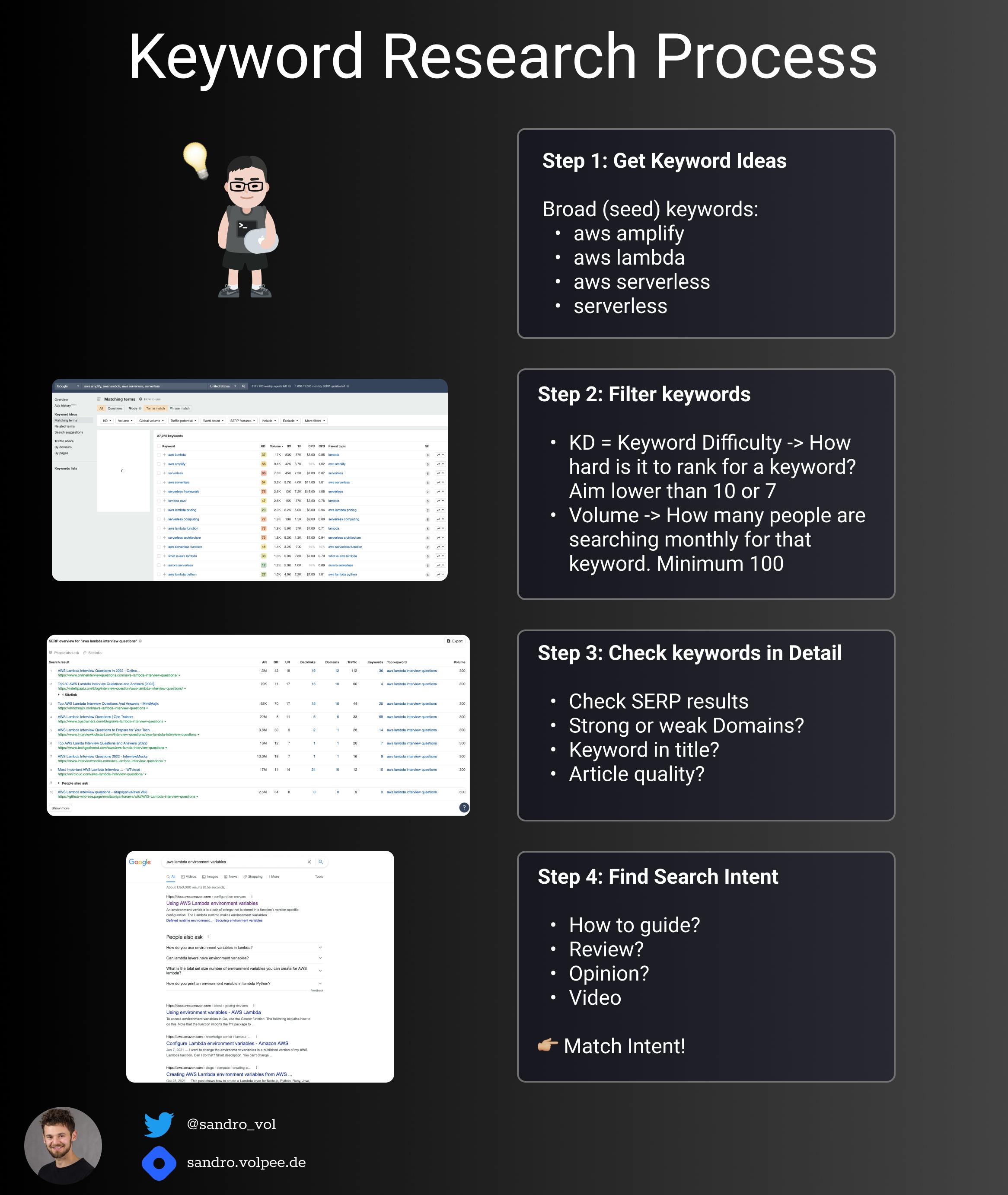
- Get keyword ideas
- Filter by difficulty and Volume
- Check the SERP if you are able to rank
- Check Search Intent
Step 1 & 2: Keyword ideas + Difficulty & Volume
The first step is always to get keyword ideas. There are many ways of getting keyword ideas. I really like using ahrefs or Google Keyword Planner for that.
I am interested in the topics AWS, Amplify, Lambda, and Serverless. So I pick out some seed keywords, so some general topics that describe my interests, and look for keyword matches.
Seed Keywords are simply put categories of keywords you want to look for
As seed keywords, I use: aws amplify, aws lambda, aws serverless, serverless
ahrefs Keyword Explorer
I start out with the keyword explorer in ahrefs and enter the seed keywords. I click on the left on Matching Terms and have a look at the results:
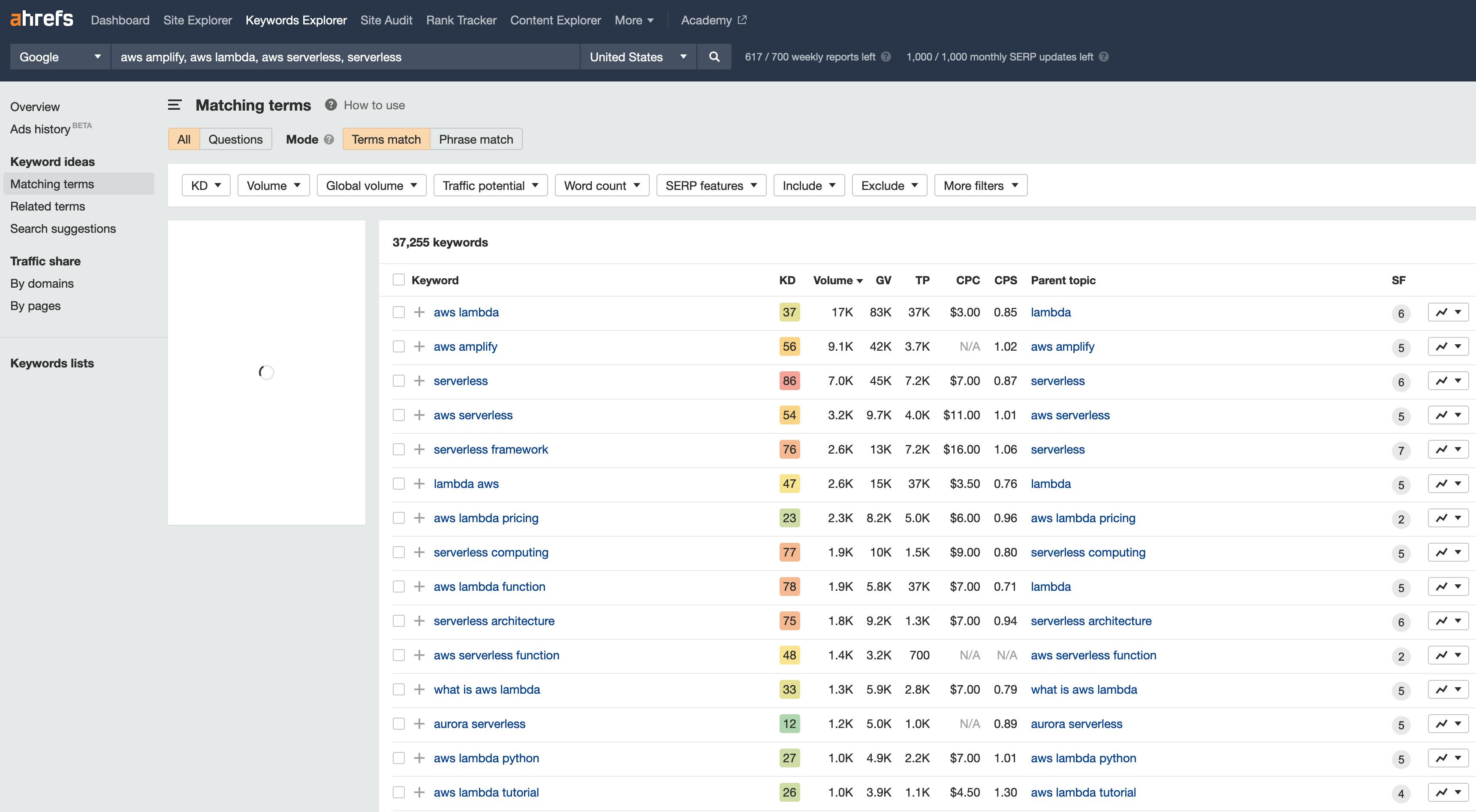
To find low competition keywords I filter by two things.
- Keyword Difficulty (KD): How difficult is it to rank for such a keyword (based on links pointing to your blog)
- Volume: How much search volume is there each month?
Let's set KD to a maximum of 7 and Volume to a minimum of 200.
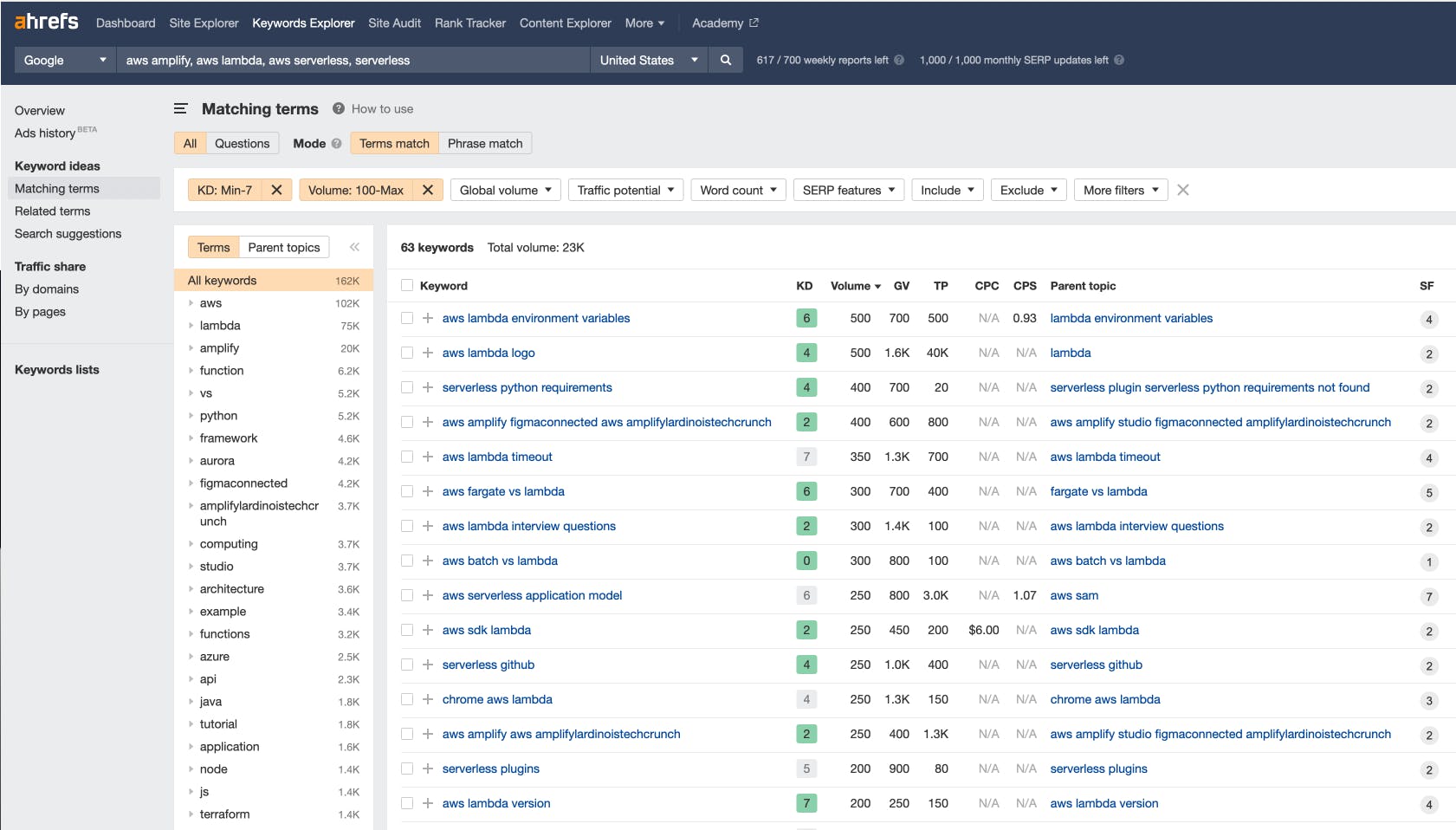
This narrows down the results to 26 keywords. If we skim through the list I can find keywords for:
- aws lambda environment variables
- aws lambda timeout
- aws fargate vs lambda
- aws lambda interview questions
All of them with a decent amount of traffic and with very low keyword difficulty. I then go ahead and click in the keyword explorer on Related Terms and apply the same filters again.
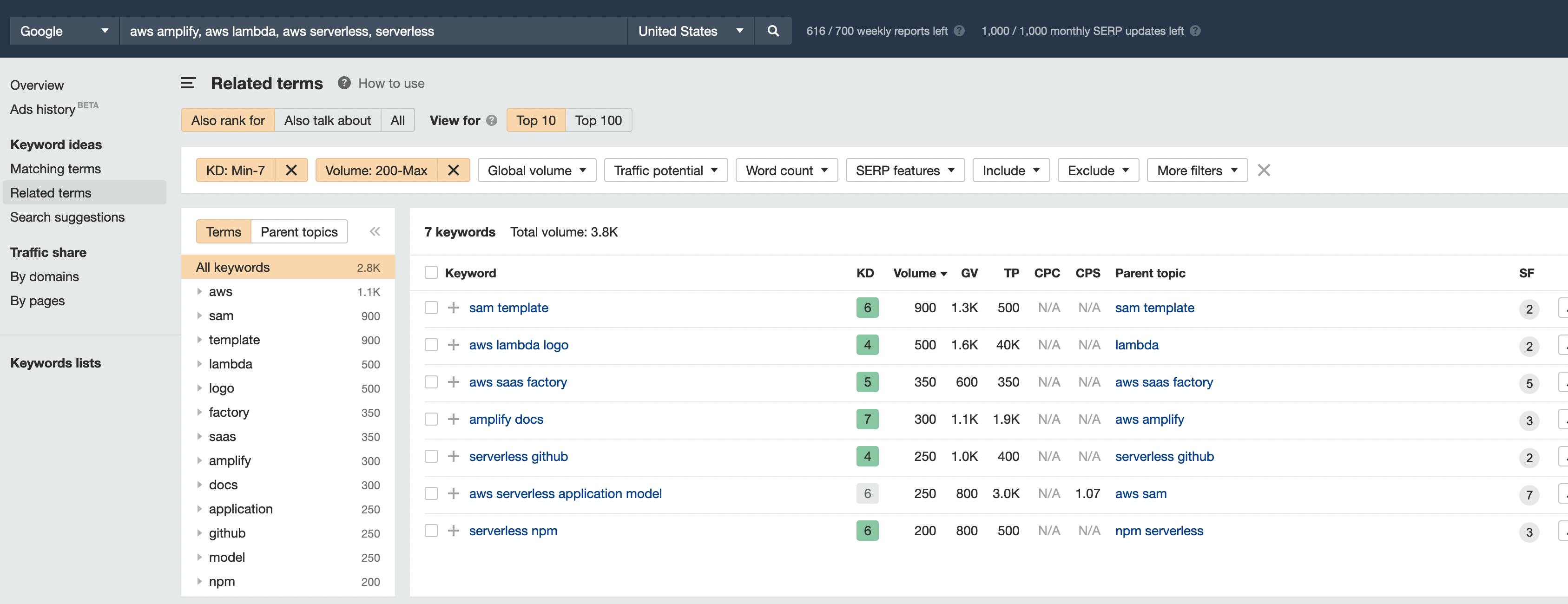
Here I also find some interesting keywords but not too many. Let's focus on the ones I found in Matching Terms.
Now we have a good list of keyword ideas. We can write them down or save them in a list to examine a bit more in detail.
Google Keyword Planner
We have a kind of similar possibility for researching in Google Keyword Planner.
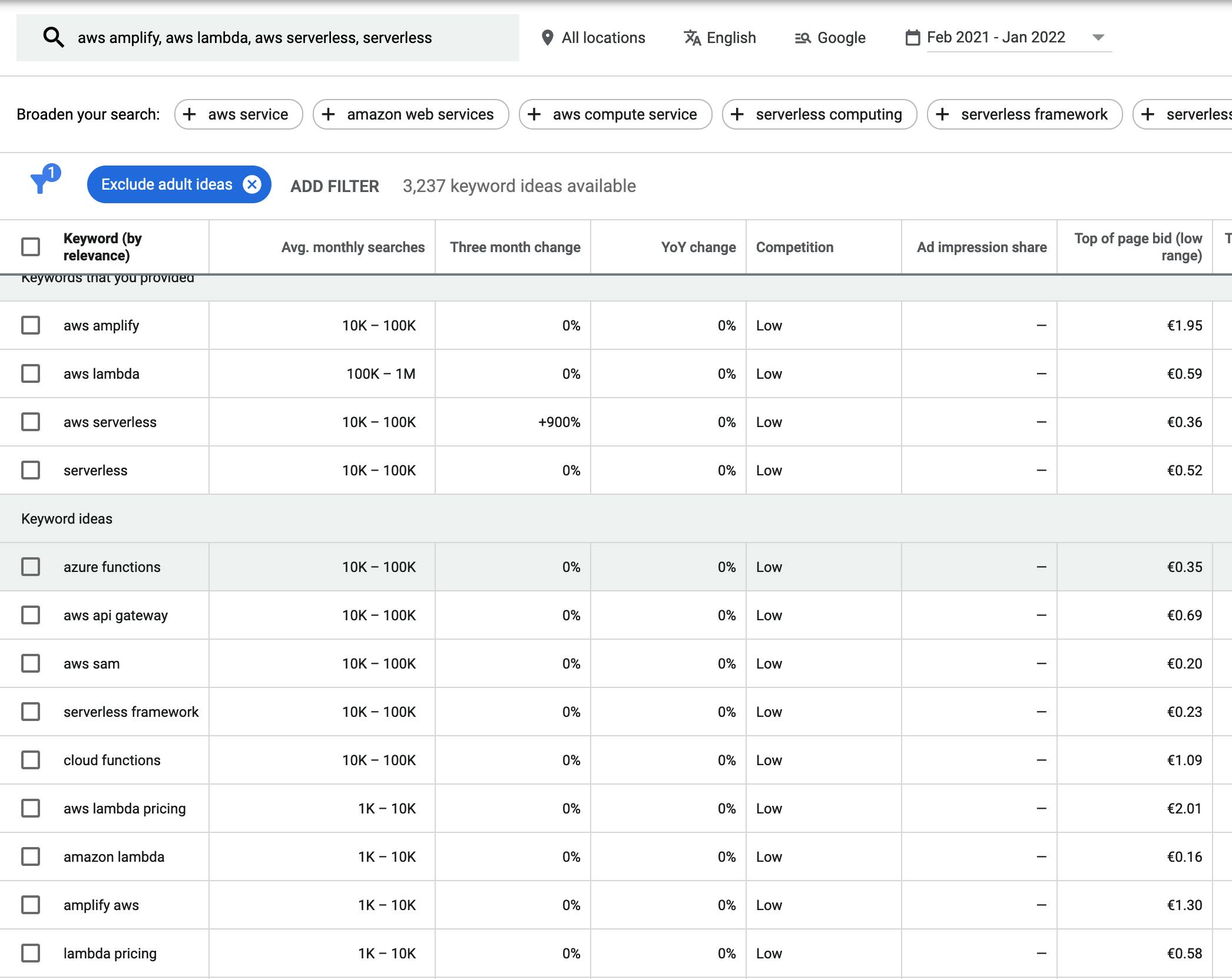
I entered all the seed keywords into the keyword planner, selected English as a language and Region worldwide. That is already different from ahrefs because in ahrefs I selected the US specifically.
Here we have some kind of similar information:
- Average monthly searches
- Competition (Low, Medium, High)
Somehow in Google Keyword Planner, almost all keywords have low competition. I am not sure how this is calculated but it doesn't seem very accurate.
The great thing in the planner is really to get some keyword ideas that are related. For example Azure Functions. We don't even look for azure or functions but both appear because it is the competitor to the keyword aws lambda. However, I cannot imagine that the competition is low for these keywords.
Keyword Difficulty
From this point, I'd select a few keywords and put them into the free keyword difficulty search from ahrefs.
So for example I take the three keywords:
- aws lambda pricing
- lambda pricing
- aws lambda python
- aws amplify pricing
And put them into the KD Checker.
I get an overview of the KD and the Top 3 SERPs in ahrefs.
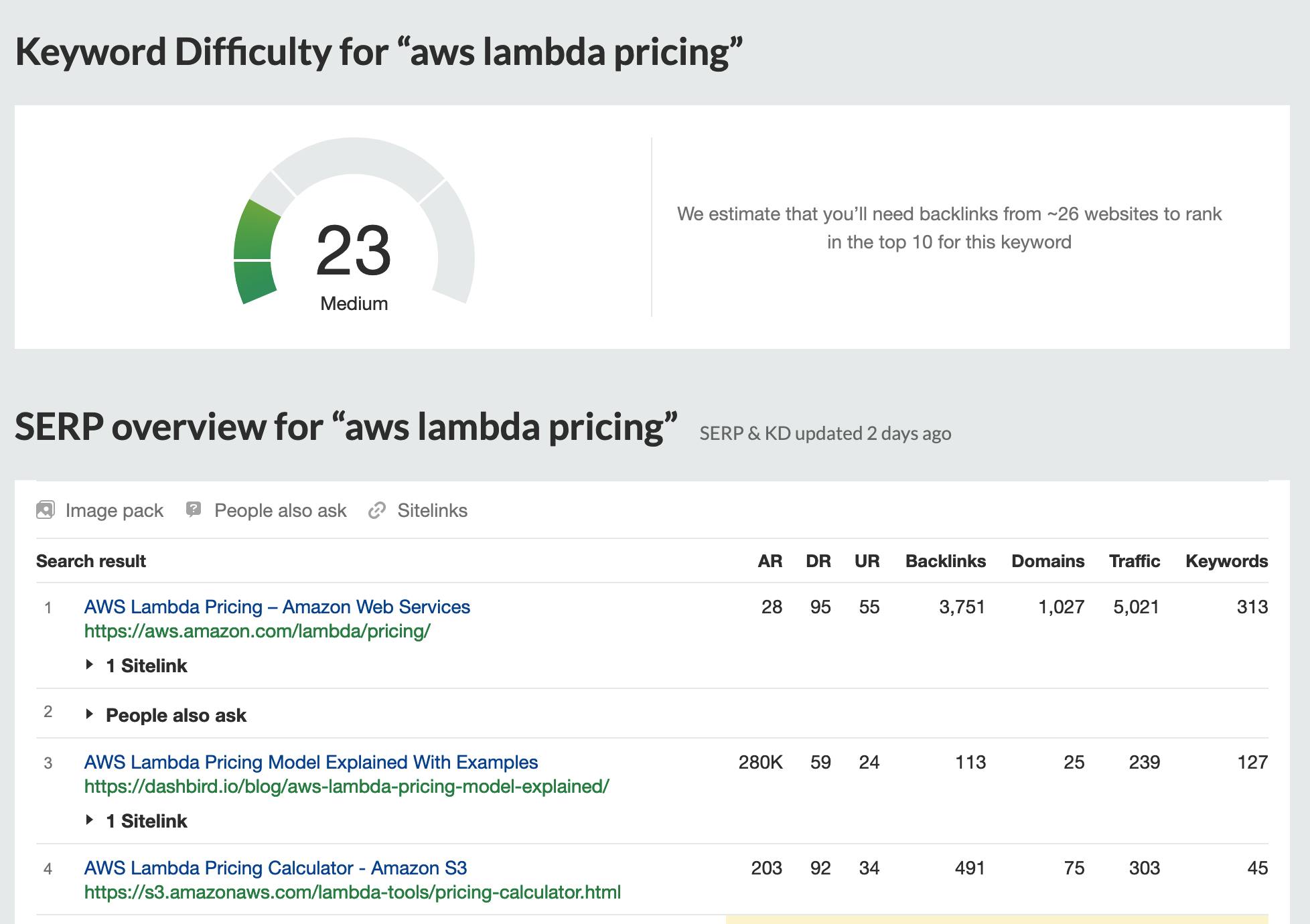
I can see that the KD is kinda high for this keyword so I check the two others as well.


All 3 have a KD of > 20. This is rather high and I would not try to rank for those, especially not with a small blog.

The fourth keyword aws amplify pricing has a quite low KD of 7. I would check the SERP and go for that!
You can see that we can do similar things with the Keyword Planner tool as well it is just a two-step process and it is not that accurate. It will probably take a bit longer for researching in the same quality as with ahrefs.
Step 3: Check Keywords in Detail
We've got our list with low-competition keywords now. But attention. That doesn't mean that we are easily able to rank for those. We still need to look at the SERP.
SERP = Search Engine Results Page (Google Search Results)
With ahrefs we can simply scroll down in the keyword explorer and check the section called SERP. This will show us a few things. Without we need to go to the normal Google search results and check those.
Negative Example - aws lambda environment variables
Let's do that for one negative example where it is unlikely to rank for:
aws lambda environment variables
Let's have a look at the overview of the keyword.
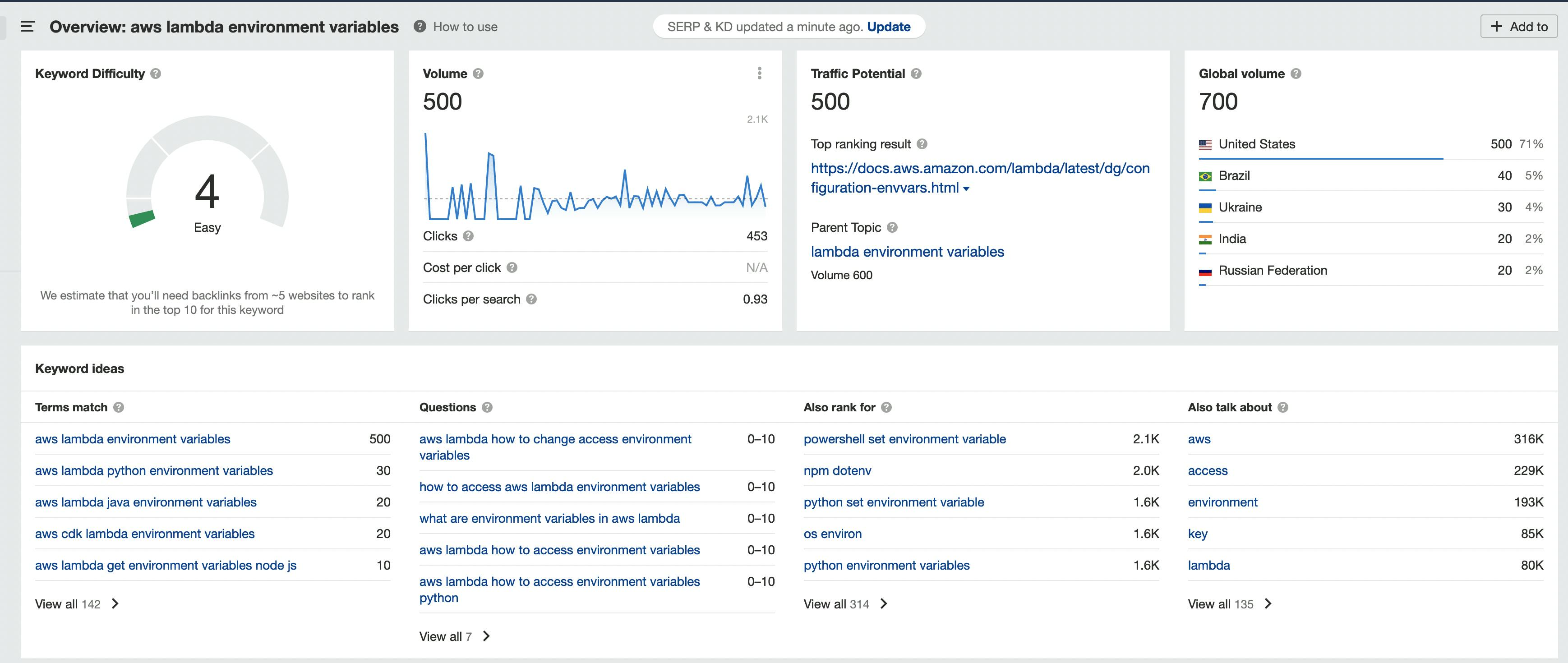
There is a lot of information here. First of all the most important ones are Keyword Difficulty (KD) and Volume. Both were already verified and they are:
- KD: 4
- Volume: 500
Cool, that means we have about 500 monthly search queries and don't need many backlinks for ranking for this keyword. Looks promising so far.
Let's take a look at the SERP.
This shows us some really great insights.
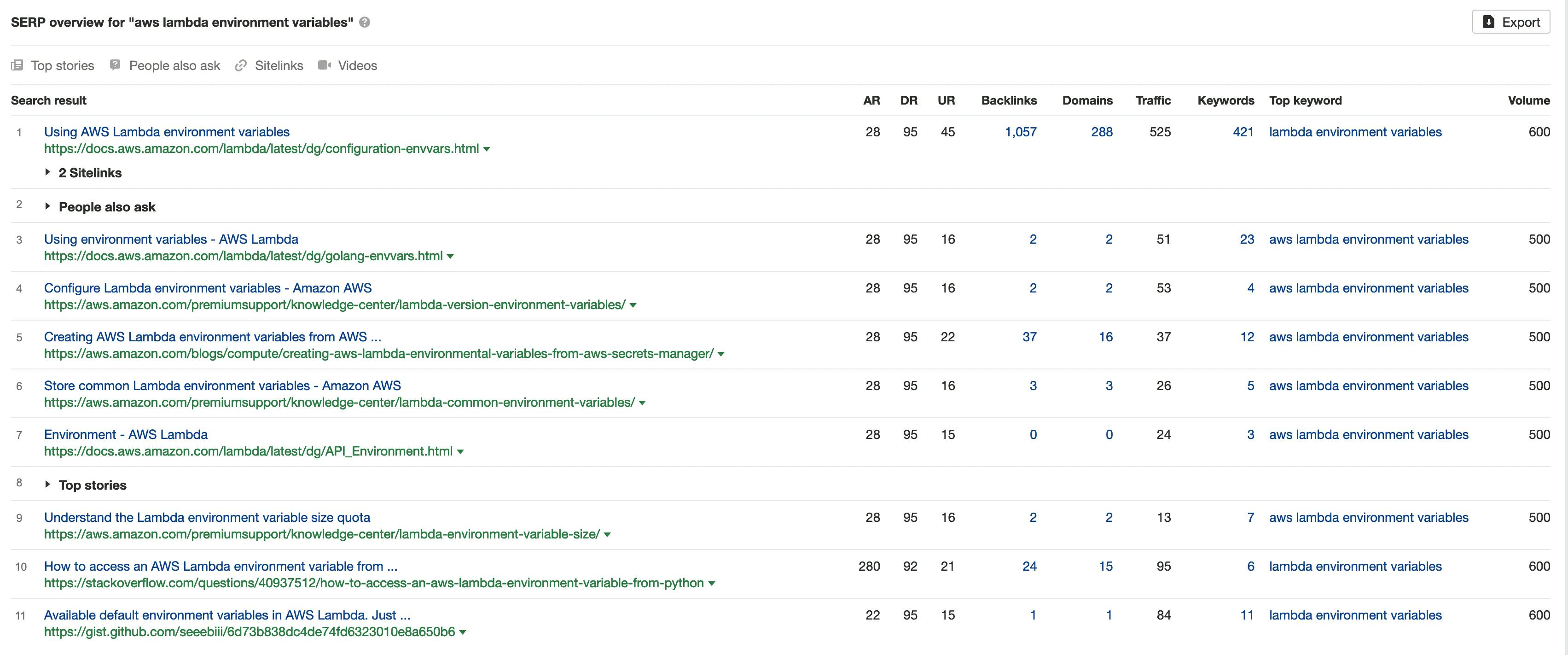
There is a lot of information here. One thing I mainly focus on is the ahrefs rating (AR). This shows you how strong or weak a page is.
Almost all of the results are coming directly from the AWS documentation page. AWS is of course a really strong domain with tons of backlinks. This is shown in the ahrefs Rating (AR). The lower the number the better the website. Normally, we look for websites with a ranking of> 1 million to compete with.
I wouldn't go for this keyword since I am not comfortable trying to outrank AWS.
I'll check the results with the normal Google US search as well:
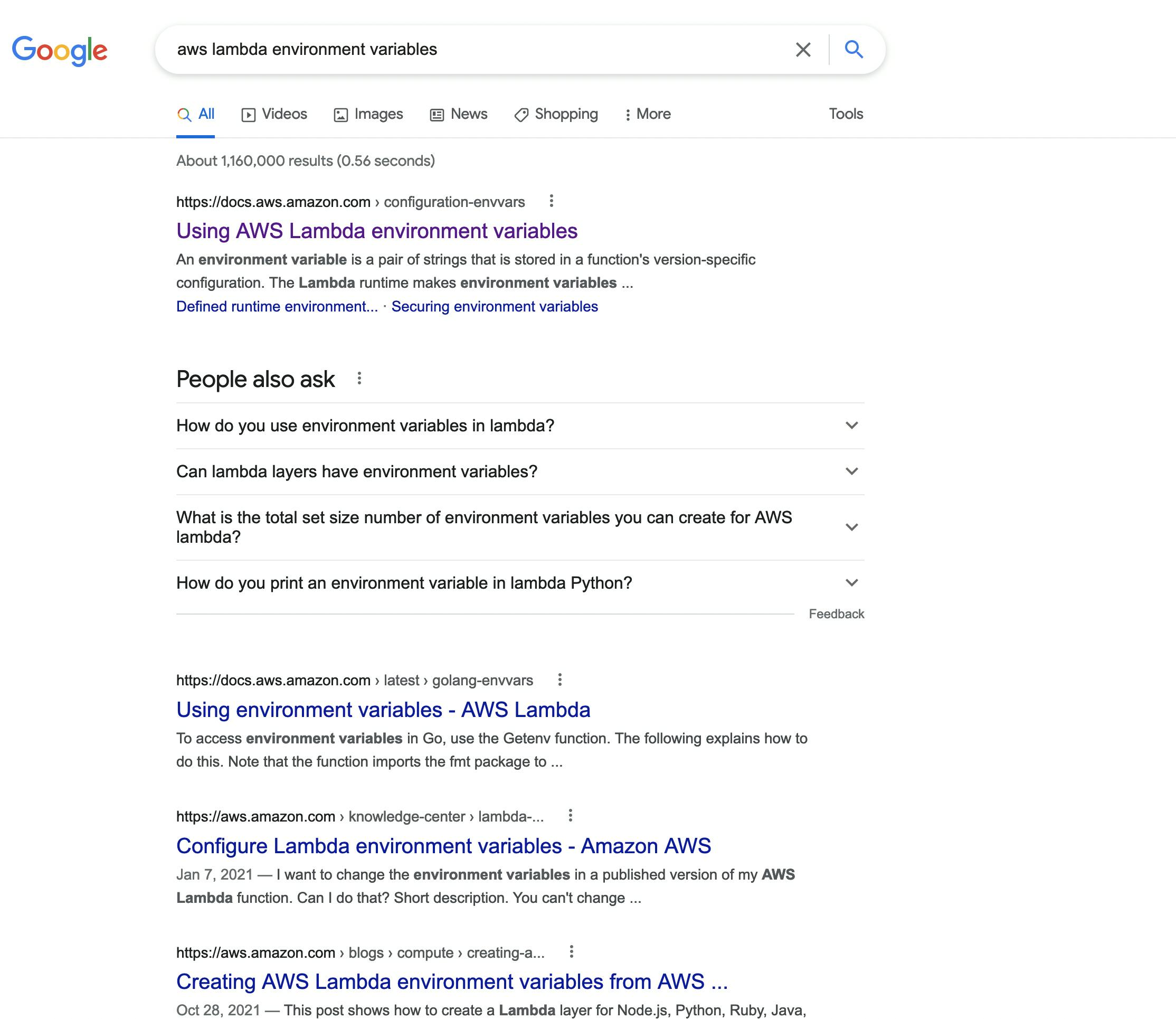
And I can see that this is quite true. I do think that a high-quality blog post with enough images, words, and good quality could beat that but I don't think I am the first one to try so I leave that one and choose another keyword from the list. This whole process is not possible without ahrefs. But you can simply Google the terms and see for yourself if just really popular domains rank or if there are some smaller blogs as well.
Positive Example - aws lambda interview questions
This time I take aws lambda interview questions.
Let's take a look at the overview for this one:

KD: 2 -> very low ✅ Volume: 300 -> 300 searches per month ✅
SERP
Let's take a look at the search results for this keyword.
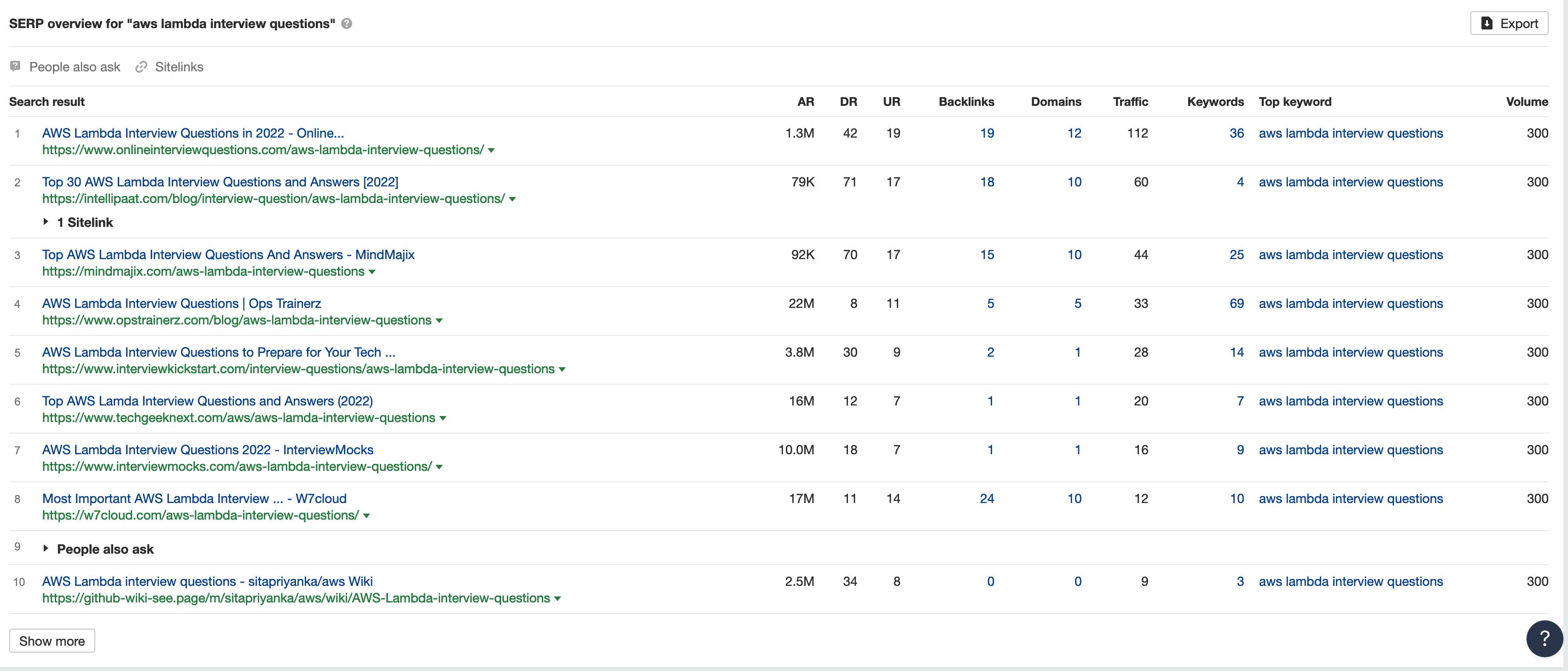
The SERP also looks way better. You can see that 7 out of 10 results have an ahrefs rating of > 1 Mio. That means there are a lot of places to compete with.
Even when we take a look at some of the search results we see that the quality of these articles is not super good. So I feel comfortable competing with these sites.
Step 4: Search Intent / Article Format
I decided on a keyword now: aws lambda interview questions. The last part really is the search intent and article format.
Since I am mainly talking about technical topics I assume it will be mostly a blog post. But still, it is important what kind of article format google is ranking higher.
The most common are:
- How to guides
- Reviews
- Step by step guides
- List posts
If we take a look at the search results we see that it mainly shows lists of questions and answers about AWS Lambda. I think this is pretty straightforward for this keyword.
Summary Keyword Research
In summary the keyword research for finding low competition keywords consists of the basic steps:
- Get keyword ideas
- Filter by volume and KD
- Look at search results and see if you can rank
- Get Article Format and Search Intent
We've decided on a keyword and can continue to write the article.
From there I'll continue with writing the article on AWS Lambda Interview Questions
Writing the article
Now let's have a quick look at the topic of writing an article. Of course, you should have basic knowledge or at best be an expert in what you want to write about.
Before starting articles that should rank well I recommend having a look at the search results and seeing what the articles are doing good and what could be improved.
The top 10 results show you some pages you will compete with. Mostly, these are the pages with a relatively high ahrefs rating (not many backlinks) and articles that are not targeted perfectly.
Let's have a look at the SERP in ahrefs again for aws lambda interview questions:
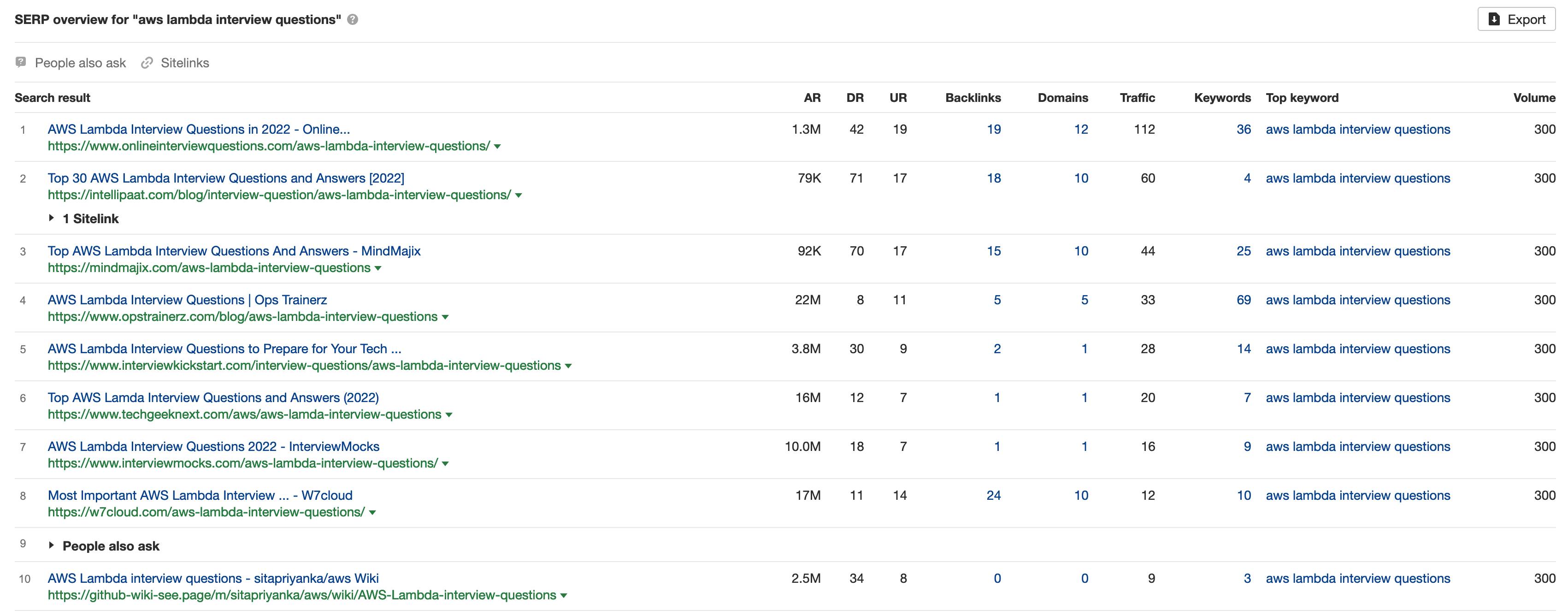
Let's pick a few example articles to compete with. Normally you will compete with those that have:
- Keyword not exactly in the title
- ahrefs rating really high (> 1 Mio)
- Short article or bad quality
Let's go through these criteria:
Keyword not in the title: All have the keyword in the title
ahrefs rating high: All except one have a really high ahrefs rating
Short or bad article: Here I'd check the word count and just the article quality in general. For this I can see some flaws:
- This article for example is really short. It just answers a few simple questions without a proper intro.
- This is for example just some crawled github-wiki page. So we should easy outrank it as well
For our example, we can't really figure out clear competitors because we compete with all of them. The main thing we can see is that all show questions + answers. We should definitely give a bit more introduction to the article, add images and format the article nicer.
You should always aim at having a longer article compared to the competitors. Most articles have 600-700 words, so we aim at least for 1,000 words.
There is a lot more to writing articles of course. The main things I focus on is:
- Have the exact keyword somewhere in your title
- Have good quality
- More words than competitors
Take this with a grain of salt of course. Don't overwrite it if you don't have anything to say. We still focus on quality a lot!
Article Timeline
Okay, game time. I've written my article on AWS Lambda Interview Questions and published it on 26. February.
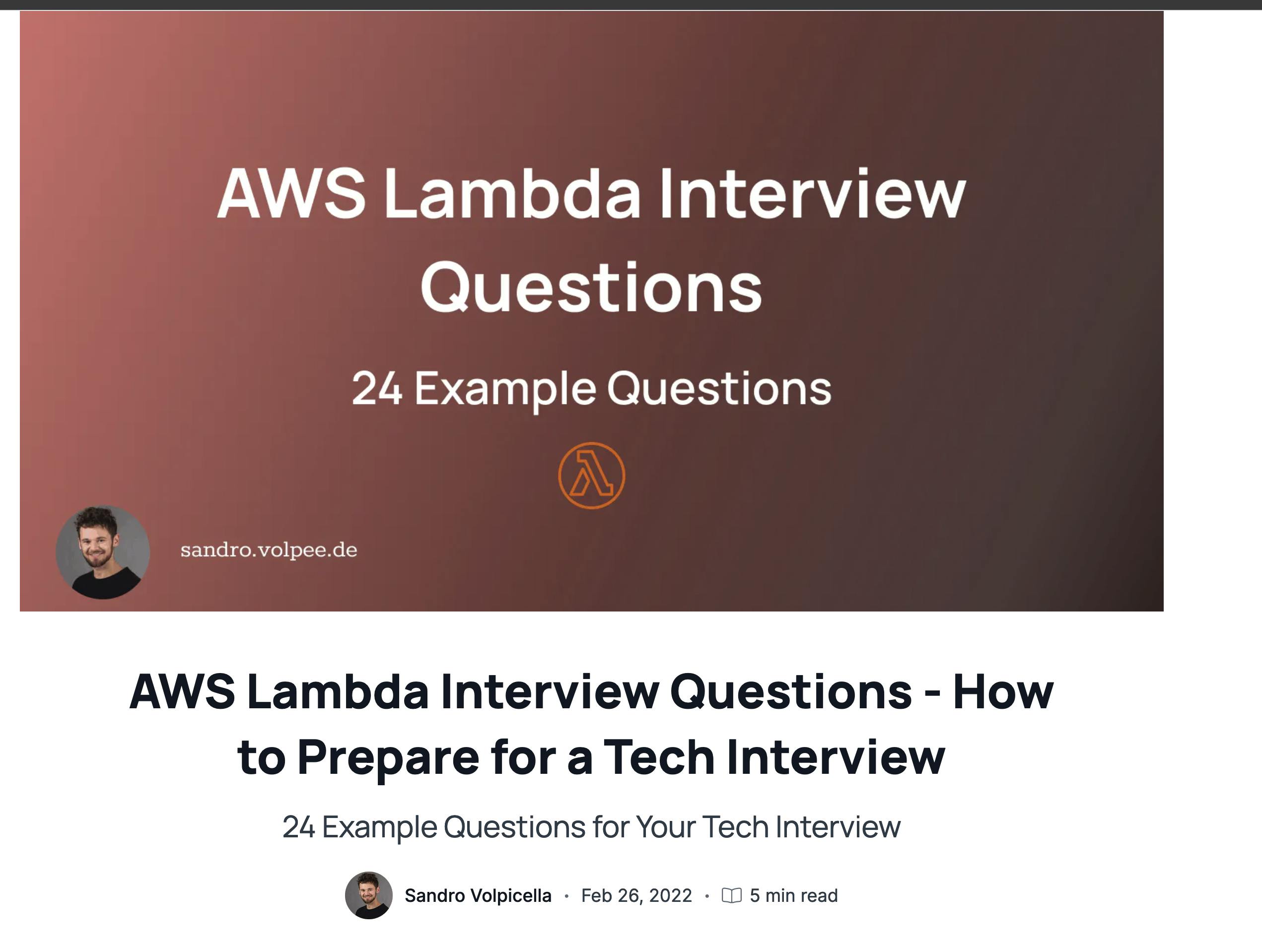
It will take a few days till the article will be picked up by the various search engines. I will update this blog post.
Submit to Google Search Console
The article was not picked up after a week so I simply submitted the URL to the Google Search Console. Simply go to URL Inspection, type in your URL. If it says URL is on Google, everything is fine. If not click on Request Indexing

Ranks on Google Page 1
After submitting the URL the blog post ranked on page one after just another week. 🥳
On the 07th of March, it was in the last place on page one. It is highly likely that it will switch places several times (and maybe goes to page two even 😰).
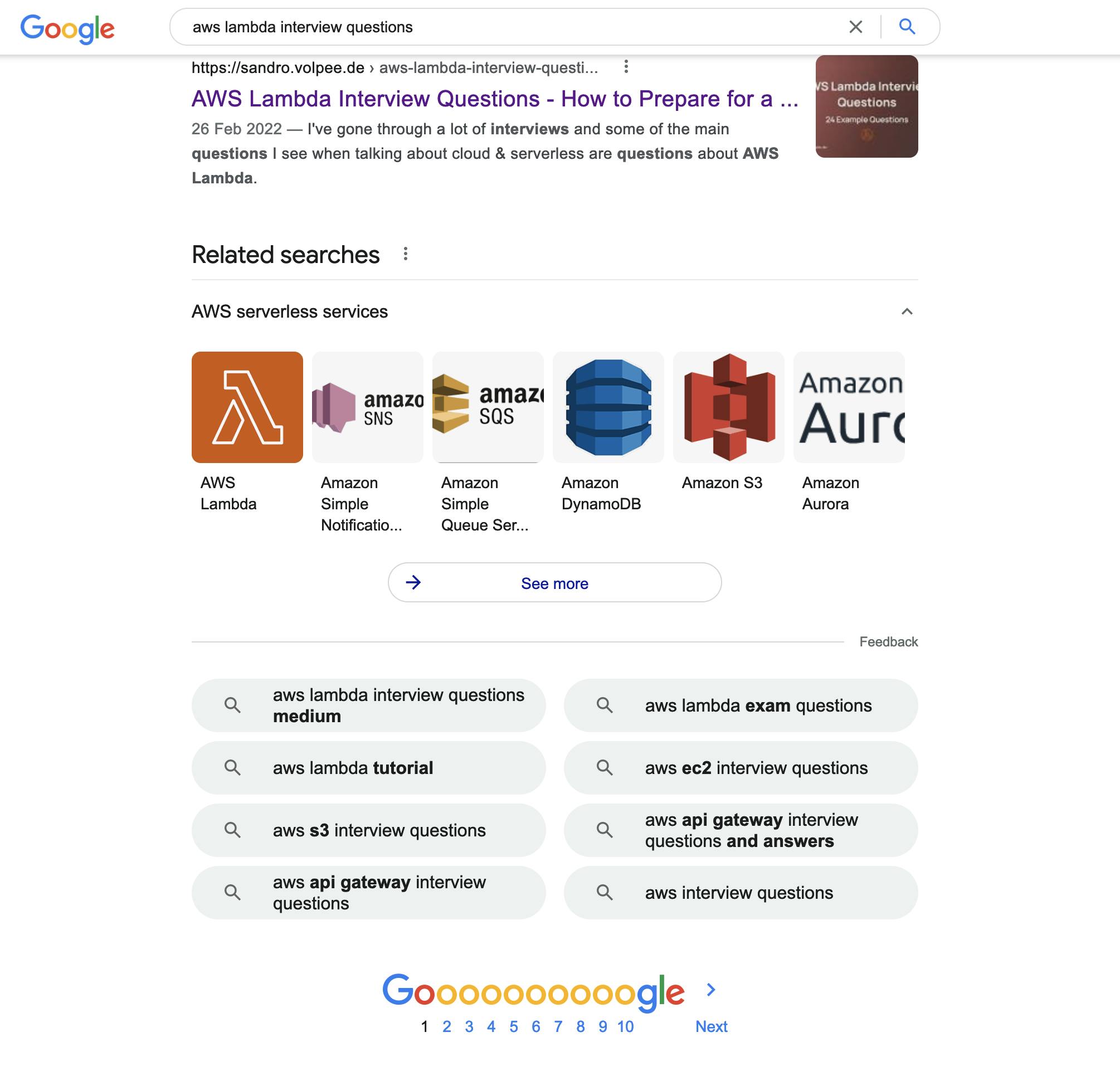
But still, that shows that the process of researching concrete article ideas can definitely make sense before writing an article.
Technical SEO
One important note. This whole blogpost was about researching what to write and some basics about how to write. This all assumes that the technical SEO is correct.
That means for example:
- Google is able to index your page
- No client-side rendered content
- Performance is good
and much more! I publish my articles on hashnode and by using hashnode all of the technical aspects of publishing are given. If you have your own WordPress blog or publish somewhere else you need to check that.
Summary
This blog post showed you how to conduct keyword research with free and with paid tools. I definitely think that it is worth it to pay for ahrefs if you use it more professionally but I am also sure that Google Keyword Planner is more than enough to get started with.
SEO doesn't have to mean that you create bullshit content. It simply drives organic growth to your blog. At the same time, you help people by creating content they really want.
If you want to see how I am building SaaS projects on the cloud and drive traffic to them via SEO follow me on Twitter
Resources
There are tons of resources. The ones I really like are:

